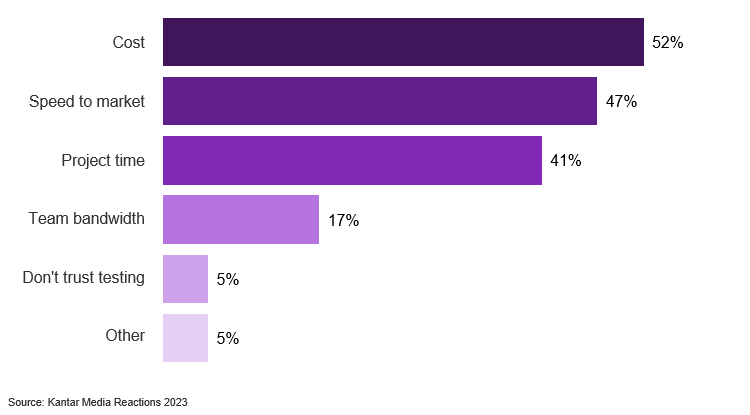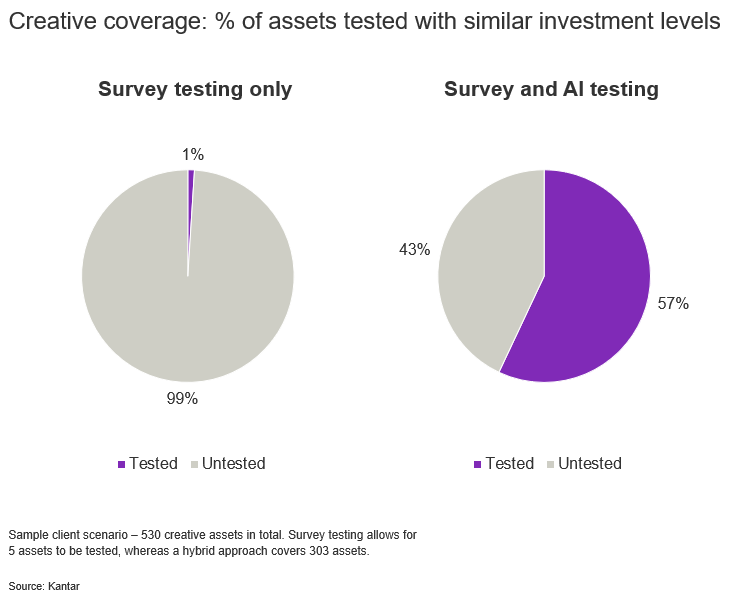Are your ads a shot in the dark?
In the current economic environment, marketers are in an increasingly challenging position as they aim to reach ambitious targets while facing budgetary pressures. The world of brand communications has scaled drastically over recent years and marketers now run campaigns with more creative assets than ever before. So, in a world where you produce creative at scale, how do you ensure that your investment delivers for your brand? A recent study from Kantar and WARC proved that great creative delivers 4 times the profit.
Embracing a continuous testing culture empowers marketers to select, fine-tune and optimise creative for maximum effectiveness. By doing so, you steer your creative away from assumptions towards a practice of data-driven decision making. Marketers agree that knowing the strength of the individual assets becomes an imperative in today’s hypercompetitive environment. According to Kantar’s Media Reactions study, 76% of marketers think that all major assets in a campaign should be tested. However, there is a disconnect between what marketers think and what they do. For the 42% of marketers that test little to none of their creative, their creative efforts may be a shot in the dark. What are the barriers that marketers feel keep them away from evaluating the creative quality of more of their assets? Marketers see cost, speed to market and project time as the biggest barriers to testing more of their content.
Barriers to creative testing

The importance of understanding creative quality at scale
A hybrid approach to testing can overcome the biggest barriers in order for marketers to test more creative within their existing budgets. Adopting a hybrid approach to testing whereby some ads are researched with real people and others are tested via AI solutions can unlock opportunities for marketers to understand creative quality at scale. Whereas in the past, your research budget may sufficiently cover survey testing for 5 ads for your brand a year, with a similar investment and thanks to a hybrid approach you can now understand the creative quality across a high volume of assets, giving you more opportunities for selection and optimisation. Hybrid can also mean the inclusion of some AI features within survey-based testing, as we have done for many years with facial coding, and as we are starting to do with predictive eye-tracking. It can also mean applying AI algorithms on top of survey-based results, e.g. to extend market coverage. We expect these kinds of hybrid blends to increase in popularity and adoption. But the major short-term opportunity for brands is a more strategic combination of standalone survey and AI testing.
At Kantar, we are launching a new subscription service that allows you to test way more assets with similar levels of research investment by combining LINK AI and LINK+. Marketers can now stretch their budgets further to cover more ads, with a lower cost per ad than before. A possible application of the subscription allows marketers to test 57% of their assets instead of 1% when using survey testing only.
Scale, Speed, Savings

Benefits of going hybrid
The inclusion of AI testing in addition to survey testing addresses the barriers to testing that marketers currently experience. It allows you to test at scale, cost-effectively and at speed. How can marketers leverage this hybrid approach best? Firstly, we recommend marketers continue to use survey testing to understand their hero copies, such as a key ad in a campaign that aims to reposition the brand and establish different associations in people’s minds. Secondly, when expanding into a new, high opportunity market, marketers need to understand whether their creative is fit for purpose and survey testing can help uncover opportunities to optimise. In partnership with survey testing, AI testing can then be used to ensure that the effectiveness of campaigns can be scaled. You can use AI testing to test variations of the same ad, different placements of the ad in digital channels or understand how the ad will do in smaller markets.
Unilever has exemplified this best practice by leveraging LINK AI to test many of their digital assets. Historically, Unilever tested only a small proportion of their digital video assets, but by adopting LINK AI for Digital, Unilever can now achieve greater speed and scale of testing within their digital budgets and make even more informed decisions as they launch digital campaigns.
"LINK AI for Digital has enabled us make quick decisions, pick from our best creatives, test video edits and even measure competitor campaigns with speed and at scale." Neha Sharma, Global Brand Engagement Lead, Unilever
Combining both survey and AI testing means that you get the best of both worlds. You gain insights driven by feedback from real people and you gain scale and speed thanks to AI. With Kantar you also have the benefit of having a common language across the two, with LINK AI delivering many of the same established, validated measures which are available via the LINK+ survey testing approach. Having both in your toolkit creates a virtuous loop when your survey testing and AI testing are in the same place and using the same metrics. Your survey testing continues to inform and refine the accuracy of your AI testing, and your AI testing contextualises your survey results.
Achieving the best of both worlds just got even easier and even more attractive with the launch of Link Subscriptions. Click here to request a demo and find out more about how we can design an integrated Link Subscription package tailored perfectly to your AI and survey-based testing needs.


